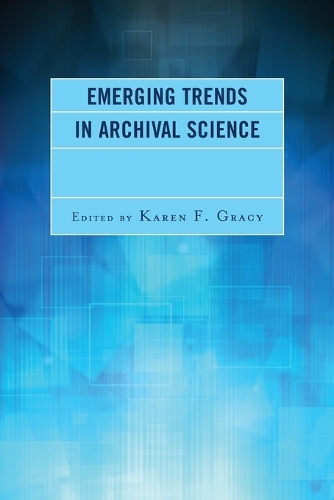
Emerging Trends in Archival Science
(Paperback)
Publishing Details
Emerging Trends in Archival Science
By (Author) Karen F. Gracy
Bloomsbury Publishing PLC
Rowman & Littlefield Publishers
1st November 2017
United States
Classifications
Professional and Scholarly
Non Fiction
025
Physical Properties
Paperback
168
Width 153mm, Height 229mm, Spine 11mm
240g
Description
Emerging Trends in Archival Science provides readers with an excellent overview of the variety and scope of current scholarly thinking in archival science. A new generation of thinkers is making the case for the importance of archives for addressing grand societal challenges such as peace and security, human rights, and adaptation to technological change in the information society. These emergent archival scholars are bringing fresh insights about the nature of the archival endeavor and the role of archives in preserving evidence of an increasingly complex and diverse society. They are thinking about how people create, manage, and interact with records and how the next generation of archivists can best be equipped to handle the recordkeeping challenges of the twenty-first century.
Reviews
This volume showcases some of the very best new research ideas from practice and the academy. It demonstrates the value of archival thinking when applied to social justice issues and dislocation and war and offers new approaches to documenting social events. -- Elizabeth Shepherd, professor of archives and records management and director of research, University College London
This volume pushes us to rethink traditional archival roles and responsibilities. From refugees and survivors of human rights abuse to performance artists and citizens, the archival stakeholders described here shift our narrow conceptions of record creators and users and expand the field for the better. -- Michelle Caswell Ph.D, assistant professor, Department of Information Studies, University of CaliforniaLos Angeles
Karen F. Gracy has brought together a series of articles that demonstrates the power and relevance of international archival scholarship in the twenty-first century. Touching on issues of historical consciousness, postfactual politics, collective memory, identity, human rights, and social justice, the articles broaden our understanding of the nature and function of recorded knowledge, the impact of records on the lives of those who create them and those whose lives are bound within them, and the choices that record-keeping professionals face when negotiating various rights and claims in the name of documenting, acquiring, and preserving that knowledge and making it accessible. -- Ciaran B. Trace, associate professor, School of Information, University of TexasAustin, and editor, Information & Culture: A Journal of History
Author Bio
Karen F. Gracy is an associate professor in the School of Information at Kent State University. Her scholarly interests span cultural heritage stewardship, which encompasses preservation and conservation processes and practices; digital curation activities that consider the roles of heritage professionals and users in the lifecycle of objects and records; and knowledge representation activities such as definitions of knowledge domains, development of standards for description, and application of new technologies to improve access to cultural heritage objects.
